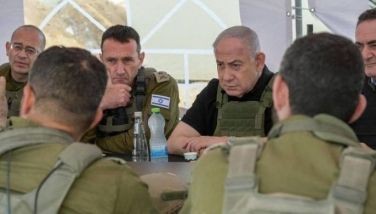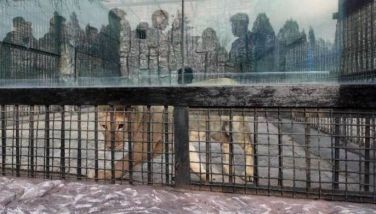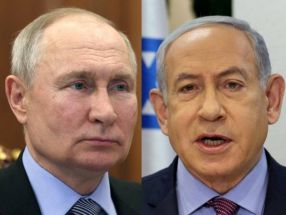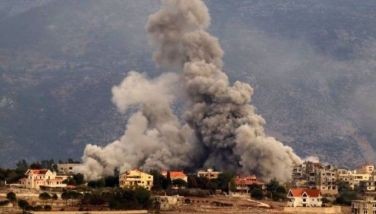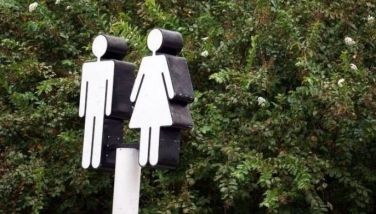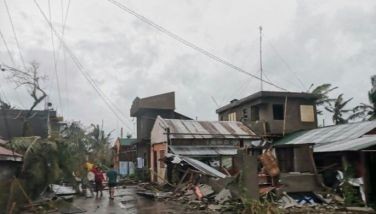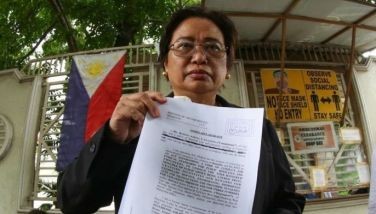Uneasy alliance of Kurds, Shiites formed in northern Iraq
KIRKUK — Shiite militiamen shuttle back and forth to the nearby front lines from a sprawling military base near the northern oil-rich city of Kirkuk. They hoist billboards of their commander, bellow Shiite prayers from mosque loudspeakers and chant the name of their spiritual leader.
All of this unsettles Kurdish leaders and residents who have sought for years to carve out a semiautonomous homeland in northern Iraq and since last summer have been battling the Sunni extremists from the Islamic State to keep hold of Kirkuk.
While the recently arrived Shiite fighters have been welcomed by the Kurds to take on a common enemy, the alliance is an uneasy one.
When the IS militants swept across northern and western Iraq last year, seizing towns and cities, tens of thousands of Shiite men answered a call to arms by the country's top Shiite cleric, Grand Ayatollah Ali al-Sistani, to defend the nation.
Now those Arab fighters have arrived in Kirkuk, long one of Iraq's most disputed territories. They have made a string of bases their home only 10 kilometers (six miles) from the city, where the Kurds have been exclusively in charge since repelling the IS militants.
Friction between the Kurds and Arabs feeds the combustible inter-ethnic competition over who will ultimately control of the city.
The Shiite fighters, officially known as the Popular Mobilization Forces, were instrumental last summer in helping the faltering Iraqi military stall the IS push outside Baghdad.
They have also teamed up with Kurdish peshmerga forces in a number of battles, breaking the siege of the northern Shiite-majority town of Amirli in August, and recently driving IS militants from a string of towns in Diyala province, northeast of the Iraqi capital.
But the arrival of the Shiite fighters in Kirkuk, 290 kilometers (180 miles) north of Baghdad, has provoked deep-rooted sensitivities.
Kirkuk, located along the fluid line that separates Kurdish northern Iraq from the rest of the country, is home to Arabs, Kurds and Turkmen, and all have competing claims to the area.
Kurdish forces claimed control of the city just days after the Islamic State group seized northern Iraqi cities including Mosul and Tikrit.
The Kurds have long wanted to incorporate the city into their semiautonomous region, but Arabs and Turkmen oppose this.
Holding onto Kirkuk has not been easy. Last month, IS fighters — aided by what the Kurds say was a Sunni sleeper cell in the city — stormed an abandoned Kirkuk hotel, and then staged a surprise attack on a peshmerga outpost, killing a top commander and several of his troops.
The attacks underscored the Kurds' tenuous hold on the city, and the semiautonomous Kurdish government appealed for more weapons and training from the US-led coalition forces.
Since then, thousands of fighters from a handful of militias such as the powerful Iran-backed Badr Brigades, have flooded into Kirkuk and surrounding Tamim province.
Kirkuk Gov. Najmaldin Karim welcomed the Shiite forces, but Massoud Barzani, the president of the Kurdish regional government, insisted that the Shiite militiamen would be "prohibited under any circumstances" from entering the city.
Badr Brigades spokesman Mullah Mohammed Yousseff roared with laughter when he was told that.
"We are already in Kirkuk," Yousseff said from behind his desk inside a trailer at the Taza Batallion base.
"We have to fight," he told recent visitors from The Associated Press. "Our religion legitimizes it."
Hadi al-Amiri, commander of the Badr Brigades, was in Kirkuk last week to deliver truckloads of weapons to Shiite fighters, At a meeting with senior Kurdish officials, he vowed to send thousands more fighters from his militia to reinforce the area — much to the consternation of the Kurds.
At least 2,000 fighters have arrived at the Taza base since al-Amiri's visit. Several militia commanders in Kirkuk estimate that as many as 5,000 Shiite fighters arrived in the region this month alone.
"I'm here because ... al-Sistani called on us to protect our country," said 24-year-old Shiite fighter Amir al-Qassim, a Baghdad native who came to Kirkuk in January.
A former minister in the Kurdish regional government, Jafar Moustafa, insisted in an interview that reports of Shiite militia presence in the city of Kirkuk are "far from reality," and that the governorate is firmly in the hands of the Kurdish peshmerga forces.
But only a few kilometers (miles) away from where Moustafa spoke, Shiite religious flags fluttered and billboards depicting al-Amiri and radical Shiite cleric Muqtada al-Sadr were hoisted alongside Shiite outposts south of the city. A loudspeaker on a mosque in one of the bases blares Shiite prayers — an unusual sound in the area.
After a recent clash with Islamic State militants, a group of Shiite fighters fired their Kalashnikov rifles into the air in celebration and chanted: "Run, Daesh, run, by the orders of al-Sistani!"
The term "Daesh" is an Arabic acronym for the Islamic State group.
Kurdish fighters stood guard less than 50 meters (yards) away along the same front line. They did not engage with the Shiite militiamen, and they declined interviews.
Sunni Muslims living in Kirkuk also have much at stake in the conflict, and many of them are viewed with suspicion — simply for being from the same sect as the IS militants. The Shiite militias have been accused of brutality against Sunni communities as they push back against the IS fighters.
A report released Sunday by Human Rights Watch accused Shiite fighters of forcing Sunni residents from their homes, kidnapping thems, and — in some cases — execution-style killings.
Such sectarian fears hang over the streets of Kirkuk, and at the outdoor bazaar in the heart of the city, many echoed concerns about the presence of the Shiite militias.
"They act like gangsters, and we are afraid of that," said Yassin Ahmed, a 24-year-old Sunni resident. "But the most important thing is that they have to take care of the people and provide us with security."
Many Kurds in the city want their brethren to remain in charge.
"Kirkuk is a Kurdish area," said 48-year-old Ali Karim. "Only the peshmerga must be in control."
- Latest
- Trending
















